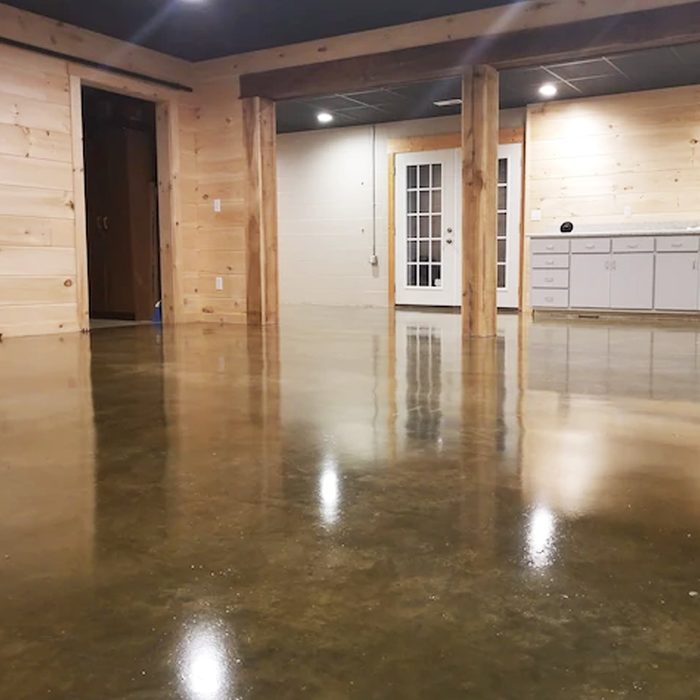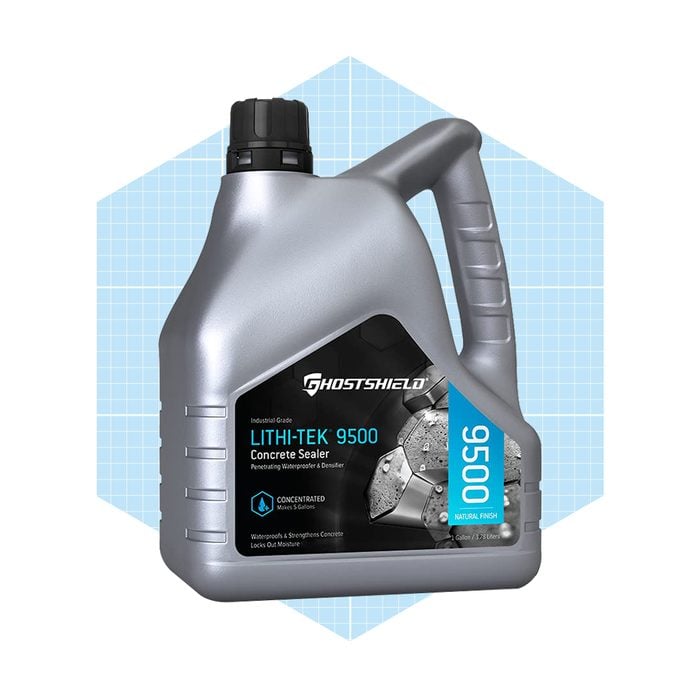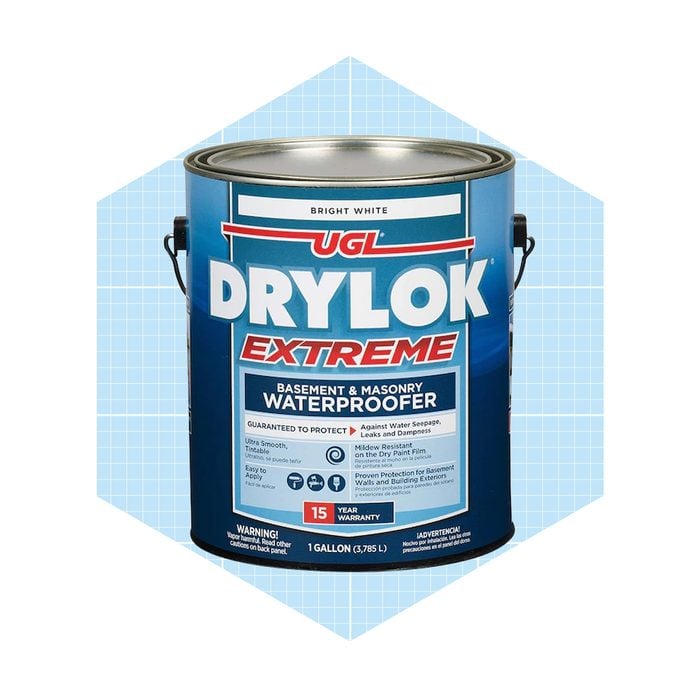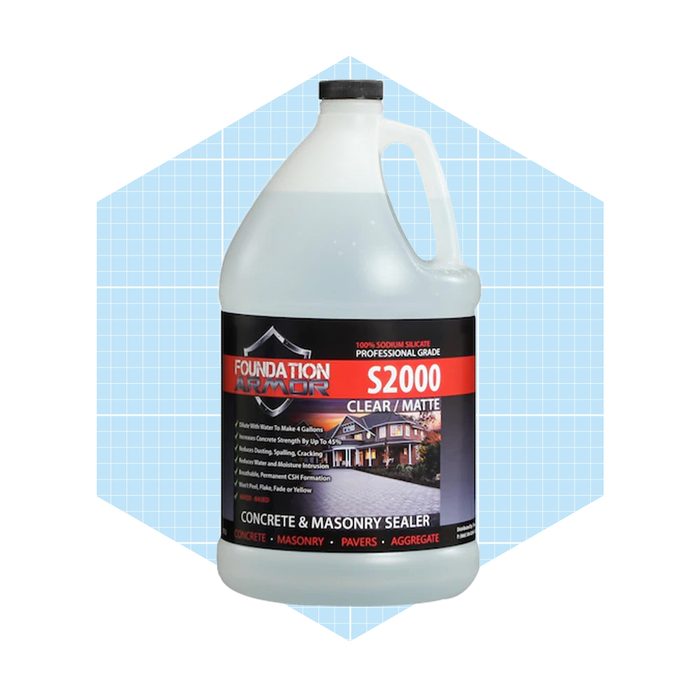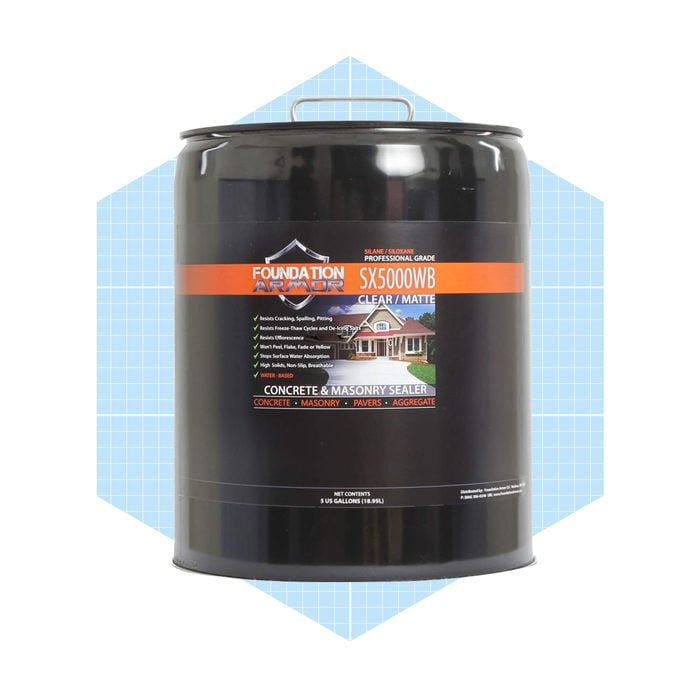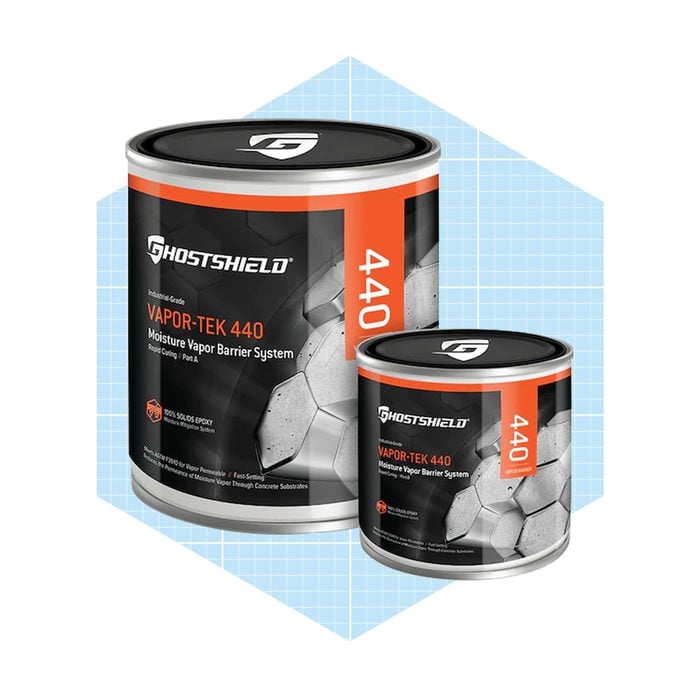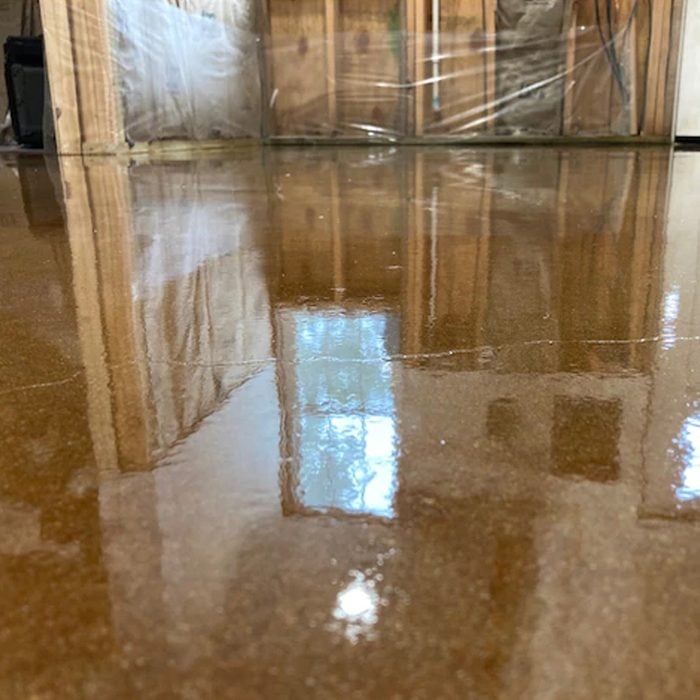Best Overall
Ghostshield Lithi-Tek Concrete Sealer
By combining a densifier and waterproofer in one product, Ghostshield Lithi-Tek Concrete Sealer penetrates and hardens while providing a surface barrier against moisture, making it our best basement sealer overall. The lithium (hence the “Lithi”) silicate has a smaller particle size than alternatives like sodium or potassium silicate, allowing it to penetrate deeper into the concrete.
This basement sealer might seem expensive compared to other gallon-sized products, but since it’s a concentrate, it actually covers up to 1,000 square feet when mixed with four gallons of water. It’s also mildew-resistant and cleans easily with just soap and water, which helps eliminate basement odors and smells.
Pros
- Exceptional value
- Resists water and moisture intrusion
- Can be used on new concrete
- Suitable for interior or exterior surfaces
Cons
- Not for cinderblock or pavers
Best Budget
Drylock Extreme Waterproofer
If you’re looking for basement waterproofing paint at a low price, this mildew-resistant product is a prime choice. One gallon treats up to 100 square feet per coat, and easily applies with a roller, paint sprayer or brush.
Its solid white color is simple to tint as well, making it convenient for those who want a specific basement paint color. This product isn’t intended for floors though, so you’ll need to purchase a separate basement floor sealer if you want total coverage.
Pros
- Affordable price
- No mixing required
- Easy to apply
Cons
- Not suitable for floors
Best Densifier
Foundation Armor Transparent Concrete Sealer
Add this Foundation Armor densifier to your cart if you’re looking to increase the strength, density and hardness of your basement floor. This silicate sealer reacts with the existing concrete to pack empty pores and spaces with calcium silicate hydrate, increasing its overall density. This also makes it appropriate for use as a basement wall sealer.
Foundation Armor mixes with water to provide four gallons of product, and since it works below the surface, it won’t affect the color or shade of your concrete. This basement sealer is ideal for anyone looking to mitigate concrete dust in their basement, or use it in combination with a separate waterproof sealer for maximum moisture protection.
Pros
- Single gallon provides up to 800 square feet of coverage
- Simple to apply
- Perfect for extra-porous concrete
Cons
- Must be used with a waterproof sealer for complete protection
Best Long-Lasting Sealer
Foundation Armor Penetrating Sealer
The 10-year lifespan of this Foundation Armor sealer and its hydrophobic barrier provide valuable peace of mind for anyone concerned about moisture issues, making it one of the best basement waterproofers you can buy. This silane/siloxane basement sealer requires no mixing and can be used right out of the bottle, whether you’re using a paint roller or sprayer.
When paired with a dedicated densifier, this product will have all your bases covered when it comes to comprehensive water and moisture management for a finished basement.
Pros
- Effective for up to 10 years
- Water-based formula is easier to use with a sprayer
- Five-gallon container ideal for large areas
Cons
- Must be used with a densifier
- Pricey
Best for Under Flooring
Ghostshield Vapor-Tek Concrete Sealer
Basement flooring is especially vulnerable to moisture damage, and the comprehensive protection of the Ghostshield Vapor-Tek Concrete Sealer ensures that you won’t be dealing with unnecessary headaches down the road.
This two-part epoxy bonds to create an extremely effective moisture barrier, and although its application might sound intimidating, you simply mix the two cans together and apply it with a paint roller. This extra-strong barrier also makes Vapor-Tek well-suited for basements that are at high risk for moisture issues.
Keep in mind that you may need to use this product with a separate vapor barrier before installing flooring, so check with your flooring product guide to make sure you’re doing everything correctly.
Pros
- Creates a strong barrier between flooring and the ground
- Great for moisture-sensitive basements
- 100 percent solid-based formula is thicker than solvent-based
Cons
- Pricey
- Must be used quickly once mixed
What to Consider When Buying a Basement Sealer
When choosing the best basement sealer, consider the age of your concrete. Newer concrete may be dense enough to not require a densifier. A waterproof sealer may be enough to deal with potential moisture issues, especially if you live in a climate that doesn’t produce a lot of precipitation. Older concrete will likely require a densifier application first, followed by a waterproof sealer to complete the job.
You should also take existing moisture problems into consideration. If you already have issues, sealers won’t be able to solve your problems on their own. You’ll need to explore other solutions as well, like using a dehumidifier or installing a drainage system to handle the problem from the outside-in.
Types of Basement Sealers
There are two basic types of basement sealers: densifiers and waterproofers. Densifiers penetrate concrete and cause a chemical reaction that fills the tiny air capillaries and microscopic cracks that allow water to flow through.
Waterproofers are applied to the surface of concrete, forming a watertight seal on top of the floor. While densifiers do provide some sealing properties, they need to be combined with a waterproofer to be totally effective.
How We Chose the Best Basement Sealer
As shopping experts, our only job is to help you find a winning product. We start with the research and reporting basics—what products are made of, what they look like and how much they cost—to ensure that we’re only recommending the buys that are worth your time and money. Then, we research the features that speak to the product’s quality, taking advice from industry insiders and subject matter experts on what makes a product a smart value (or worthy of a splurge). Finally, we do the work of combing through user reviews to see how real people interact with the product, and if it stands up to the test.
FAQs
Why should I seal my basement floor?
Sealing floors helps reduce water and moisture from gaining entry into your basement, which can not only create an environment that encourages mold and mildew growth, but permanently damage any flooring. Even if you don’t have any immediate moisture or leak issues, sealing your floor can be a valuable preventative measure. It also makes floors easier to clean, and depending on the type of sealer, more resistant to abrasion.
Should I seal my basement floor before finishing?
Yes, you should seal your floor as soon as it’s ready for treatment. Sealing your floor before finishing allows you to apply flooring without fear of future moisture damage, and it protect other basement furniture or construction elements from unnecessary moisture. It also reduces annoying and harmful concrete dust.
Shop smarter with our expert recommendations for tools, gear and money-saving deals on can’t miss DIY and home products. Sign up for the Stuff We Love newsletter.

